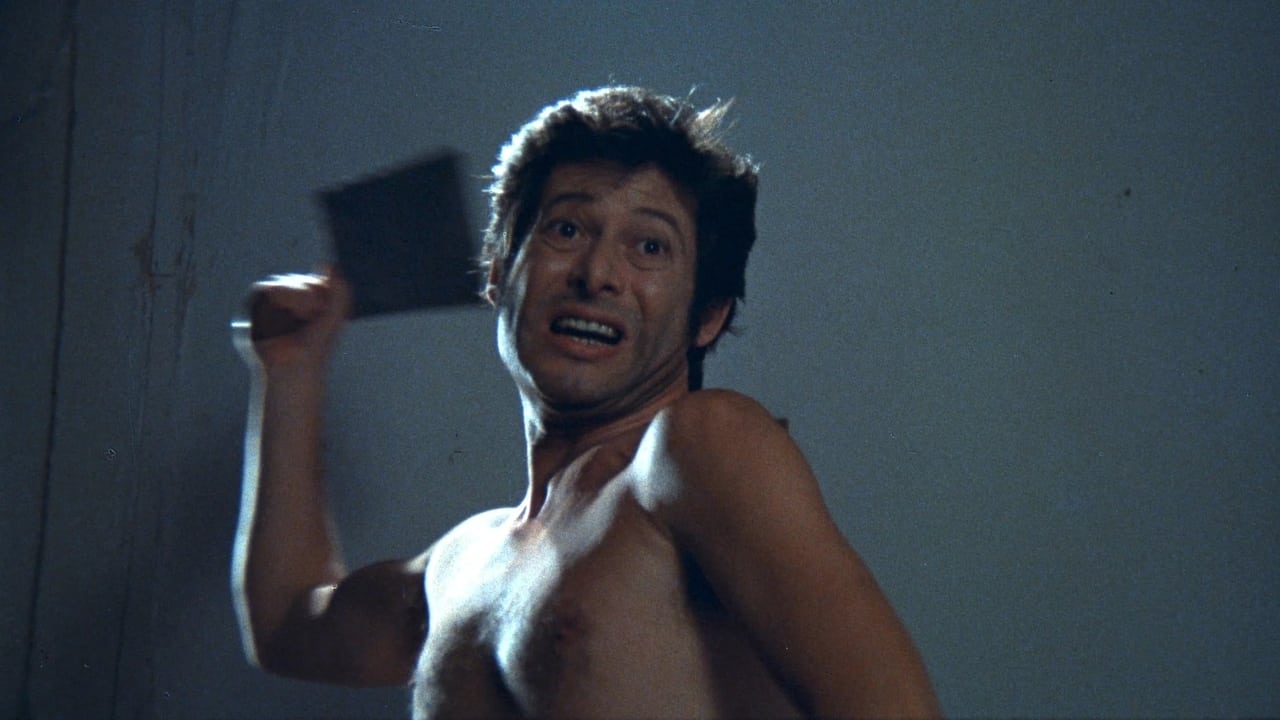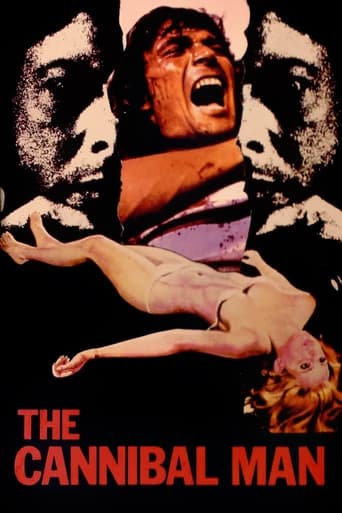Steinesongo
Too many fans seem to be blown away
Maidexpl
Entertaining from beginning to end, it maintains the spirit of the franchise while establishing it's own seal with a fun cast
ThedevilChoose
When a movie has you begging for it to end not even half way through it's pure crap. We've all seen this movie and this characters millions of times, nothing new in it. Don't waste your time.
SeeQuant
Blending excellent reporting and strong storytelling, this is a disturbing film truly stranger than fiction
lonchaney20
While writer/director Eloy de la Iglesia is well known in Spain for his quinqui (i.e. hoodlum) films, gritty depictions of young criminals and drug addicts, abroad his reputation rests largely on the shoulders of his early seventies thrillers. The most notorious of these is Cannibal Man, which gained cinematic immortality as one of Britain's Video Nasties. Like many titles on that list, this film is far more complex than its exploitative title and marketing would suggest; the original Spanish title is La semana del asesino, which means The Week of the Murderer.The murderer in this case, rather than "cannibal man" as the export title misleadingly suggests. is Marcos (Vicente Parra), a lower-class employee of the local slaughterhouse. His small shack looks like a relic when compare to the adjacent high-rise apartment, which is populated largely by affluent students. Marcos is pressured by his girlfriend Paula (Emma Cohen, one of Spain's greatest actresses) to marry, but he insists on waiting until he's promoted. One of their outings goes horribly wrong when a cab-driver, disturbed by their backseat necking, kicks them out of his taxi. Marcos refuses to pay the fare, and a scuffle breaks out. As the cab driver begins beating Paula, he utters one of the film's best lines, which is simultaneously hilarious and tinged with social commentary: "I'm gonna give you the beating your father never had time to give you!" Marcos hits him in the head with a rock, accidentally ending his life. Thus begins our protagonist's soul-destroying week, which finds him committing murder after murder in order to cover up his original crime.Though the film has its share of blood and gore, Eloy de la Iglesia is far more interested in his character's plight, as well as his social status. Marcos often reminds us that he's a poor man. When his brother and girlfriend pressure him to confess his crimes to the police, he protests that as a working class schmo he'd never get a fair trial. "The police will never believe me...and you need money to afford a good lawyer." The chain of murders only escalates as more people snoop in Marcos' shack, and react either with hostility or fear. His only friend throughout the whole ordeal is the enigmatic Nestor (Eusebio Poncela, most famous for playing the inspector in Almodovar's Matador). Nestor is a resident of the nearby high-rise, and one of the affluent students mentioned earlier. He spends his time spying on people with his binoculars, and this is how he acquaints himself with Marcos.In discussing the relationship between Marcos and Nestor, it is necessary to reference the director's sexual orientation. Eloy de la Iglesia was a gay Marxist, during a time in which homosexuality was still illegal in Spain. Though it's never blatantly mentioned, Nestor is clearly gay, and he shares the director's sympathy with the working class. Though he initially tries to impress Marcos with masculine posturing, Nestor's interactions with Marcos soon become charged with homo-eroticism. This reaches its peak in a memorable swimming pool scene, in which Marcos and Nestor swim and shower together; it's a dazzling and tender display of filmmaking, and it loses not of its potency with repeat viewings. This scene, as well as much of the political content, was unfortunately but not surprisingly censored from the Spanish version of the film, meaning that this English-dubbed export version is the closest thing to a true director's cut. Some recently discovered deleted scenes, featured on the German blu-ray, fascinatingly hint at a more explicit version. While most of the material is inessential, such as a scene in which Marcos is promoted, one of the final scenes shows Nester and Marcos passionately making out. No context is provided, and this scenes (as well as the others) features no audio. Thus this plays as a haunting footnote to the film's fascinating and complex central relationship: did de la Iglesia intend for the two men to become lovers? Is this perhaps just a fantasy of Nestor's? Or, more intriguingly, a fantasy of the classically masculine Marcos? Unless the screenplay surfaces, or someone interviews Poncela about it, we may never know.Since I am both a huge fan of this film and incredibly reckless with my money, I forked out a sizable amount of money to import the recent German blu-ray. I am pleased to say that the disc is a significant upgrade to the American DVD, and lends a greater appreciation to the director's artistry. This was my third viewing of the film, and I found it just as rewarding as the first. The surprise reveal in the deleted scenes only sweetened the deal for me, assuring me that my money was well spent. It is a complex, politically charged, yet deeply heartfelt film. I shared it with a friend on my last viewing, and I hope he will not mind if I share his thoughts on the experience: "It's really just about one man having a bad week, and the trials of having to get through it without losing his whole soul." It is that, but also much more; a film that can be appreciated from multiple perspectives. I fear that this review does not do it justice. Suffice it to say that this is truly one of the crowning achievements of Spanish horror cinema. This will also be of interest to anyone interested in the history of queer cinema, being one of the ballsiest acts of transgression ever committed under a fascist dictatorship. Though homosexuality was outlawed in Spain, de la Iglesia wore his sexuality like a badge of honor, and he continued to make films on his own terms.
fertilecelluloid
Eloy de la Iglesia's "Cannibal Man" is an exceptional study of sociopathic isolation that also comments on the gulf between how the rich and poor were treated by the authorities in Spain in '72. Vicente Parra is Marcus, a slaughterhouse worker who accidentally kills a taxi driver. Convinced that the police will not believe his account of the incident, he refuses to turn himself in. His girlfriend has other ideas and wants him to go to the police (her social status is higher than his). When she refuses to understand his position, he is left with little option but to kill her. Thus begins a chain of bloody murders as Marcus is threatened with exposure by his friends, family members, and colleagues. Eusebio Poncola, who starred in the brilliant Spanish detective series, "The Adventures of Pepe Carvahlo", plays Nestor, a wealthy local who introduces himself to Marcus. Though subtly conveyed by Iglesia, Nestor's interest in Marcus extends beyond friendship. A surreal pool scene, in which the men become entangled in the water, perfectly communicates unspoken ambitions. It turns out that the affluent Nestor is, ironically, Marcus's only potential ally in his descent into depression and madness, but his offer of help may come too late. Similar in tone to "Henry - Portrait of a Serial Killer", this is a well written, thinking man's thriller that doesn't blush at its atrocities. The film is full of magnificent, clever details. For example, Marcus is slow to rid himself of the corpses piling up in his bedroom, so the place has started to reek. Iglesias conveys the situation with wonderful black humor by showing us packs of dogs loitering at his front door for a taste of the rotten meat inside. Every night Marcus arrives home, he has to scream at the dogs as they swarm about like flies. During one of the murder scenes, the director intercuts a game of soccer going on outside. Much more than a standard horror flick, this touches on the perils of becoming more successful than your friends and the consequences of tough decisions. We sympathize with Marcus's situation, even though his actions are illegal. Putting a cherry on top of the cake is a minimalist score and creepy, electronic sound effects. Unfortunately, most versions available (including the one I saw) are dubbed. I'd kill to see this in its original language.
macabro357
(aka: APARTMENT ON THE 13TH FLOOR)The title CANNIBAL MAN is somewhat misleading for this Spanish film since it really has nothing to do with cannibalism at all.A butcher named Marcos (Vincente Parra) lives in an old whitewashed house on the edge of some new high rises that were recently built. One night he goes out on a date with his girlfriend and accidentally kills a taxi driver in a fit of rage. She wants him to turn himself into the police but he refuses.When she threatens to turn him in, he slits her throat with a long butcher's knife. And so begins his killing spree. He manages to kill five more people (including his brother, his future father-in-law, and a waitress who's real friendly towards him) in a desperate act of covering himself up before the inevitable end comes. He takes the body parts to the local slaughterhouse so they can be ground up by the machines. He also has to buy multiple cans of air freshener in order to get rid of the smell.The one person who convinces him otherwise is the young homosexual on the 13th floor of the high-rise who knows his secret but doesn't say anything about it. An act of conscious suddenly grips Marcos and the homosexual is spared.It's not a particularly gory story although there is blood and there are scenes of people being stuck with all kinds of sharp instruments. However, if you're looking for decapitations and body parts lying around, you won't find anything like that here. Everything's implied which it and of itself, works well for this particular film. Unfortunately the Anchor Bay DVD doesn't come with any extras beyond a trailer.It has good acting and a good script for an obvious low budget, obscure film even though it does share a similar theme with Claude Chabrol's more prestigious LE BOUCHER (1970). A butcher, multiple homicides etc...It beats out anything Jess Franco would've filmed around the same time.6 out of 10
r-kanne
Plot: The movies about a guy who works at a slaughterhouse and what happens to him and most of all his mind when his spouse calls it quits. Bit by bit he starts to loose it....Form: It plays out very neatly. You have to follow the story tightly to make any sense of the whole thing. Follow closely and you get a reward at the end in the form of knowledge on the human mind.Who is it for?: First of all this is not a movie for kids. It is a highly realistic movie with a hard story,lots of violence and gore and an adult theme. So if you are a sensitive viewer or under 17 I would not recommend it for viewing. There are a lot of non-violent films out there about similar topics. But on the other hand if you don`t have a problem with violence in films and like a touch of realism, this is really the one for you.
Grade: 10 out of 10

